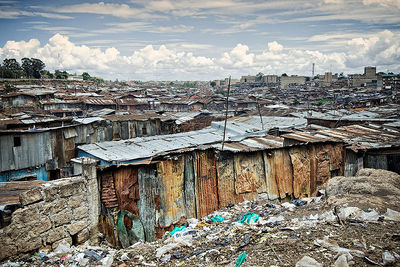Some of our finest
Citable Articles (146)
Developed Articles (1,126)
(16,427 total articles)
|
There is only one good, knowledge, and one evil, ignorance.
— Socrates (469 BC - 399 BC), Diogenes Laertius, Lives of Eminent Philosophers
—add a quotation about knowledge or writing
|
 The Mathare Valley slum near Nairobi, Kenya, in 2009. Poverty is deprivation based on lack of material resources. The concept is value-based and political. Hence its definition, causes and remedies (and the possibility of remedies) are highly contentious.[1] The word poverty may also be used figuratively to indicate a lack, instead of material goods or money, of any kind of quality, as in a poverty of imagination.
Definitions
Primary and secondary poverty
The use of the terms primary and secondary poverty dates back to Seebohm Rowntree, who conducted the second British survey to calculate the extent of poverty. This was carried out in York and was published in 1899. He defined primary poverty as having insufficient income to “obtain the minimum necessaries for the maintenance of merely physical efficiency”. In secondary poverty, the income “would be sufficient for the maintenance of merely physical efficiency were it not that some portion of it is absorbed by some other expenditure.” Even with these rigorous criteria he found that 9.9% of the population was in primary poverty and a further 17.9% in secondary.[2]
Absolute and comparative poverty
More recent definitions tend to use the terms absolute and comparative poverty. Absolute is in line with Rowntree's primary poverty, but comparative poverty is usually expressed in terms of ability to play a part in the society in which a person lives. Comparative poverty will thus vary from one country to another.[3] The difficulty of definition is illustrated by the fact that a recession can actually reduce "poverty".
Causes of poverty
The causes of poverty most often considered are:
- Character defects
- An established “culture of poverty”, with low expectations handed down from one generation to another
- Unemployment
- Irregular employment, and/or low pay
- Position in the life cycle (see below) and household size
- Disability
- Structural inequality, both within countries and between countries. (R H Tawney: “What thoughtful rich people call the problem of poverty, thoughtful poor people call with equal justice a problem of riches”)[4]
As noted above, most of these, or the extent to which they can be, or should be changed, are matters of heated controversy.
- ↑ Alcock, P. Understanding poverty. Macmillan. 1997. ch 1.
- ↑ Harris, B. The origins of the British welfare state. Palgrave Macmillan. 2004. Also, Oxford Dictionary of National Biography.
- ↑ Alcock, Pt II
- ↑ Alcock, Preface to 1st edition and pt III.
|
